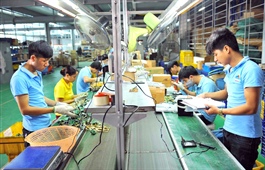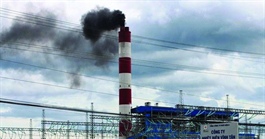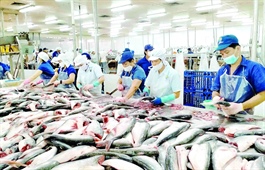Purchasing power drops, food prices rise in Ho Chi Minh City
Purchasing power drops, food prices rise in Ho Chi Minh City
Businesses across Ho Chi Minh City have increased prices of essentials due to higher production costs despite consumer purchasing power having decreased by up to 25 percent, a survey of Tuoi Tre (Youth) newspaper has shown.

Enterprises in Vietnam have issued warnings that food prices will continue to rise unless solutions are found to restrain surging food input costs, including raw materials, gasoline, and animal feed.
As a case in point, cooking oil is now being sold 15-20 percent more expensive at supermarkets in Ho Chi Minh City than at the beginning of the year, and 70-90 percent higher than the price of 2020.
Notably, Tuong An cooking oil now sells for VND60,000-160,000 (US$2.6-$6.9) per liter, depending on the type, while a set of 10 chicken or duck eggs is offered at VND33,000-VND38,000 ($1.4-$1.64) at traditional markets.
The rates are about 20 percent higher than earlier this year, and nearly double those of last year, mostly owing to higher production costs and transport expenses following the increased prices of fuels and animal feed.
"Due to higher input costs, Vinh Thanh Dat Food Corporation, based in Ho Chi Minh City, has plans to continue hiking egg prices,” said Truong Chi Thien, general director of the company.
Price increases will likely continue even though consumer purchasing power has reduced by 20 percent, Thien stated.
According to the city’s Commodity Price Stabilization Program, companies were permitted to charge VND1,500-2,000 ($0.06-0.08) more for each clutch of 10 eggs in April, he added.
Saigon Food JSC has elevated the prices of most of its processed food items by around 15 percent.
Phan Van Dung, deputy general director of Vissan, Vietnam’s leading food processor, shared that consumers’ ability to purchase fresh food items in the first four months of this year dropped by 25 percent.
He also said that the firm, after experiencing sustained losses, has been forced to push up the price of its sausages, canned goods, and cold products by five to 15 percent.
Such price rises are due to rising input costs, including those of materials and packaging, which have surged by 20-40 percent, Dung explained.
Dung also warned that the price of animal feed has spiked significantly, creating difficulties for pig breeders.
“The government should take measures to keep feed prices in check, otherwise the supply of pigs may plunge over the next few months, raising pork prices, and therefore making products which use pork more expensive,” Dung stated.
Ly Kim Chi, president of the Ho Chi Minh City Food and Foodstuff Association, said the purchasing power for processed and dried foods and spices has slipped by 15 to 20 percent, but many traders are likely to hike prices in the near future in order to make up for higher production costs.
“It is necessary to enact measures that limit increases in the prices of raw materials, animal feed, and fuels, or food will become inevitably more expensive, even when consumer demand is low,” warned Nguyen Dang Hien, vice-chairman of the Association of Enterprises in Industrial Parks in Ho Chi Minh City.
Many companies expect to launch a new drive of price increases given higher gasoline prices, Hien said.
He recommended that the government consider reducing the VAT and excise tax on gasoline and oil to help stabilize market prices and control inflation.
“We need the administration’s support by reducing lending interest rates or extending the loan terms so that we can reduce production cost and thereby rein in price hikes,” a representative of a food enterprise suggested.

























